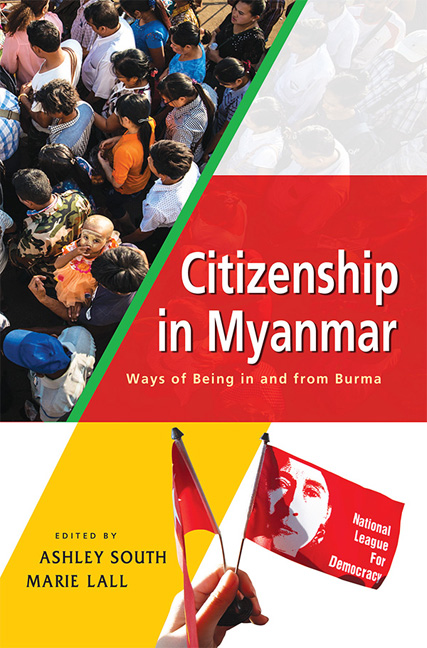Book contents
- Frontmatter
- Dedication
- Contents
- Foreword
- The Contributors
- Map of Myanmar
- Introduction
- 1 Ethnic Politics and Citizenship in History
- 2 Representation and Citizenship in the Future Integration of Ethnic Armed Actors in Myanmar/Burma
- Special Contribution: The Way Forward for Peace, Stability and Progress in Burma/Myanmar
- 3 National Political Dialogue and Practices of Citizenship in Myanmar
- 4 Citizenship and Minority Rights: The Role of “National Race Affairs” Ministers in Myanmar's 2008 Constitution
- Special Contribution: Karenni People at a Glance
- 5 Myanmar's Youth and the Question of Citizenship
- Special Contribution: I Am a Citizen of Myanmar
- 6 “The Value of Life”: Citizenship, Entitlement and Moral Legibility in Provincial Myanmar
- Special Contribution: How I Became Shan
- 7 Conflict and Mass Violence in Arakan (Rakine State): The 1942 Events and Political Identity Formation
- 8 Exploring the Issue of Citizenship in Rakhine State
- Special Contribution: Rohingya and Nationality Status in Myanmar
- 9 Myanmar's Other Muslims: The Case of the Kaman
- Special Contribution: Interview with P'doh Kweh Htoo Win
- Index
9 - Myanmar's Other Muslims: The Case of the Kaman
Published online by Cambridge University Press: 28 June 2018
- Frontmatter
- Dedication
- Contents
- Foreword
- The Contributors
- Map of Myanmar
- Introduction
- 1 Ethnic Politics and Citizenship in History
- 2 Representation and Citizenship in the Future Integration of Ethnic Armed Actors in Myanmar/Burma
- Special Contribution: The Way Forward for Peace, Stability and Progress in Burma/Myanmar
- 3 National Political Dialogue and Practices of Citizenship in Myanmar
- 4 Citizenship and Minority Rights: The Role of “National Race Affairs” Ministers in Myanmar's 2008 Constitution
- Special Contribution: Karenni People at a Glance
- 5 Myanmar's Youth and the Question of Citizenship
- Special Contribution: I Am a Citizen of Myanmar
- 6 “The Value of Life”: Citizenship, Entitlement and Moral Legibility in Provincial Myanmar
- Special Contribution: How I Became Shan
- 7 Conflict and Mass Violence in Arakan (Rakine State): The 1942 Events and Political Identity Formation
- 8 Exploring the Issue of Citizenship in Rakhine State
- Special Contribution: Rohingya and Nationality Status in Myanmar
- 9 Myanmar's Other Muslims: The Case of the Kaman
- Special Contribution: Interview with P'doh Kweh Htoo Win
- Index
Summary
INTRODUCTION
The story of rather chronic discrimination and persecution by successive governments of Myanmar meted out against Muslims — especially the worldfamous statelessness of the Rohingya — before and after transition started in 2010 is taken for granted. Questions relating to eligibility, recognition, and protection of Muslims’ citizenship have therefore been raised. Largely informed by a meta-narrative of the plight of the Myanmar Muslim minority, those questions have been answered by making generalizing arguments that governments and Buddhists in Myanmar discriminate against and/or persecute a Muslim minority. This tendency has unfortunately led to lack of sophistication and nuance in making academic and/or journalistic arguments about Myanmar's Muslims.
By conducting a case study of the Kaman that is now the only governmentrecognized Muslim ethnic group in Buddhist Myanmar, this article suggests that there are two or more Muslim minorities with different relationships with the state and society in Myanmar that have significant impact on their identity and citizenship in Myanmar. Attention to those intra-communal differences even within the so-called Muslim minority of Myanmar is expected to contribute not only to research on Muslims in the country but also to policy advice for betterment of diverse minority groups that constitute Myanmar's Muslims.
ANTI-MUSLIM VIOLENCE AS CHALLENGE OF TRANSITION
Myanmar's political and social liberalization post-2011 could be traced back to the sham general elections in november 20102 held by the previous military regime (state law and order restoration council/state peace and development council [slorc/spdc]). the quasi-civilian government headed by president u thein sein, ex-general and ex-prime minister during the previous military rule, came to power in late march 2011. after the election the government initiated a series of political reforms, including the release of nobel laureate daw aung san suu kyi from house arrest on 13 november (six days after the election, following a period of detention of fifteen years from 1989).
- Type
- Chapter
- Information
- Citizenship in MyanmarWays of Being in and from Burma, pp. 279 - 300Publisher: ISEAS–Yusof Ishak InstitutePrint publication year: 2017



